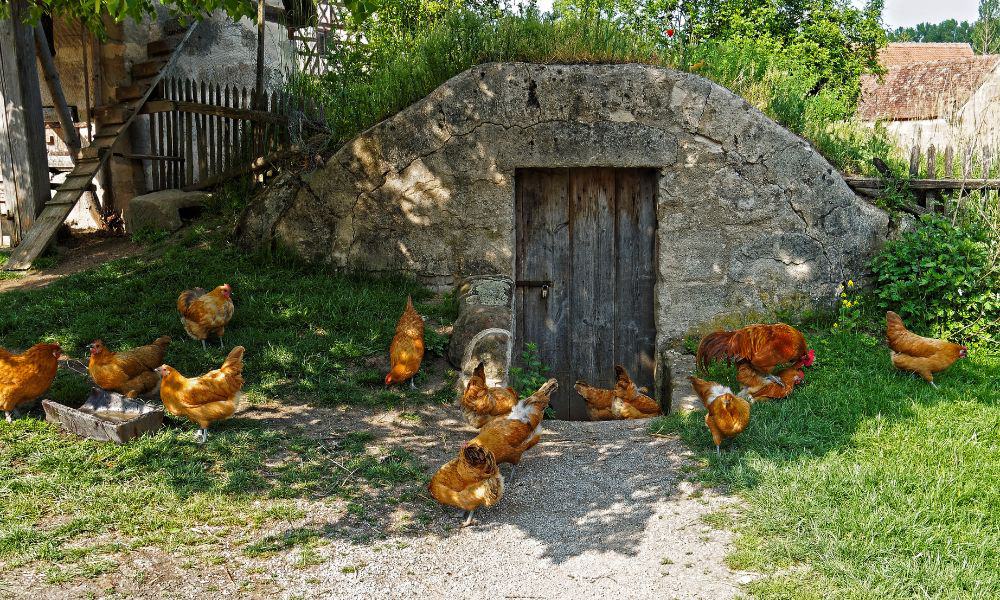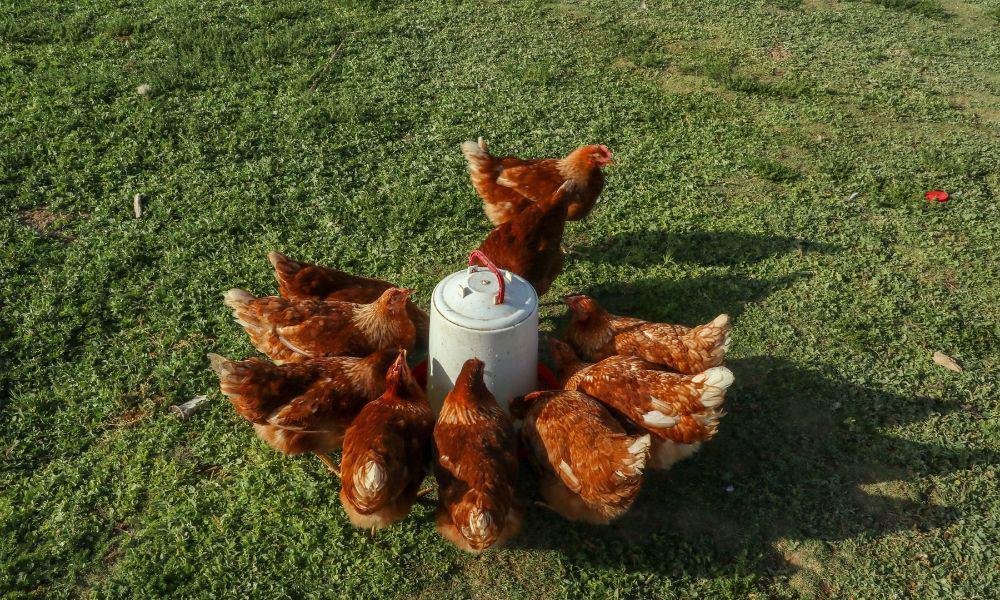It’s quite well known in the chicken community that hens lay fewer eggs during the colder months of fall and winter.
So, when you’re expecting your flock to be pumping them out during the warmer months of summer and their not delivering their quota, you start asking yourself: what gives?!
Here’s a bit of a checklist you can run through to try to identify any problems caused by the hotter temperatures that may explain why your chickens have stopped laying eggs in summer.
Contents
Why Have My Chickens Stopped Laying Eggs In Summer?

In winter, when the days are shorter and the temperatures are much colder, it’s natural for a chicken to go on a laying hiatus or at least take longer to lay between each egg.
This is due to a combination of the days being shorter, providing less light to stimulate the egg-laying cycle, and colder temperatures, causing chooks to use more energy to stay warm.
But in summer, it’s expected that hens lay more consistently than any other time in the year.
If your chickens have stopped laying eggs in summer, the most common causes include:
- Dehydration
- Heat stress
- Broody hens
- They’re just having a break!
Dehydration

The greater exposure to sunlight and hotter temperatures in summer can very quickly dehydrate your chooks.
In fact, it only takes as little as a few hours for dehydration to impact a chicken’s egg production.
Something as simple as having free access to water 24/7 in summer will help your chickens stay hydrated and combat the warmer temperatures without going on an egg-laying hiatus!
Heat Stress
Just like how harsh cold weather can disrupt a chicken’s normal egg-laying habits, harsh hot weather can too!
In fact, the optimal temperature for chickens to lay eggs is between 19-22°C (62-71°F). The further you deviate from this “thermoneutral zone” the harder your chooks will have to work to lay their eggs normally.
When temperatures get too hot, from about 85°F or more, chickens can quite easily develop heat stress, or at least feel some of the impacts of the harsh hotter temperatures – including laying fewer eggs!
It’s also important to note that the temperature INSIDE your chicken coop doesn’t always match the temperature OUTSIDE.
You should test the temperature inside your coop, particularly if it’s small or gets very little airflow as it may be much hotter and cause heat stress in your flock.
Broody Hens
By now you must have either had a first-hand experience with, or at least heard of broody hens.
No matter what time of the time year, it’s entirely possible that one or more of your hens simply becomes broody, forgoing their egg-laying process in an attempt to sit on and hatch eggs (even if there aren’t any eggs to sit on!).
There’s no quick and easy fix for a broody hen. But, you can discourage their broodiness by taking them out of the coop for food and water, and shutting access to your nesting boxes during the day!
They’re Just Taking A Break!
One very real reason your chickens may have stopped laying eggs in summer is that they are simply taking a break.
Even production breeds won’t lay a single egg every single day of the year (although some can come close!).
If you’ve got yourself any standard breed of chicken you can really only expect between 120-200 eggs per year.
Sure, most of the time they may be laying every day, but there will be other times when they get broody, are molting, or are simply taking a break from egg laying – even in summer!
How to Help Chickens Resume Laying Eggs
Fortunately, there are a few extra adjustments you can make to ensure you’re helping your chickens get through some of the adverse effects of the warmer weather.
Providing 24/7 access to water, providing sufficient shade, and ensuring your chicken coop is big enough and well-ventilated enough will give your chickens the best chances at laying all through summer.
Provide 24/7 Access To Water
Because of how quickly chickens can become dehydrated in summer, I highly recommend allowing your chickens 24/7 access to a fresh, clean water supply.
This means adding a big enough waterer to the inside of your chicken run (if you keep your chicken coop open at night), or inside your chicken coop if you lock your coop at night.
Just as importantly, you should make sure the waterer can hold enough water that the heat can’t chickens can’t possibly drink it all while you’re away. This is where automatic bell, cup, or nipple drinkers work a charm.
You might also want to provide your chickens with electrolytes for rapid hydration too.
Provide Sufficient Shade
Although it’s fine if your chickens like to sunbathe sometimes, it’s greatly important to offer them more than enough shade too!
If you have a large flock with a well-established pecking order, then you might even want to consider having more than just one or two shady spots in your backyard and chicken run.
This is just in case the alpha chickens dominate the shady space, leaving the chickens on the lower end of the hierarchy left space in the shade!
Check Your Chicken Coop Size And Ventilation
An overcrowded coop is the quickest way to get yourself some upset chickens.
Sure, they may seem like themselves, but they may be suffering from many different stressors, including heat stress, any of which can cause your chickens to lay fewer eggs (amongst other harmful effects).
As a general rule, you should allow 4 square feet of space per chicken in your coop, and 10 square feet of space per chicken outdoors.
Once you’ve got your spacing right, do a quick test of the airflow and keep a thermostat in your coop so you can check the temperature isn’t going through the roof!
In Conclusion
If your hens have been laying noticeably fewer eggs in summer, then it’s worth doing a bit of an investigation as normally summer months offer the best yield in egg production.
With the rise in temperatures and longer hours with the sunning beating down, chickens can very quickly become dehydrated or become overheated.
These are the most likely causes of your chicken’s egg-laying downfall in summer. However, it’s also possible your hens have simply become broody, or they’re just on a normal egg-laying hiatus.
Still, it’s worth doing a bit of a check on their water supply, access to shade, and coop size and ventilation to be sure you’re giving them the best chance of continuing to lay eggs regularly and healthily.
